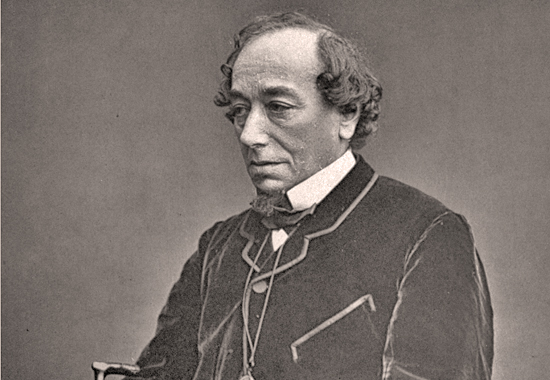|

ON THE PRINCIPLES OF THE
CONSERVATIVE PARTY - DISRAELI 1872
Sanitas Sanitatum, Omnia Sanitas
It follows the transcript of
Benjamin Disraeli's Sanitas Sanitatum, Omnia
Sanitas speech, delivered at the Free Trade Hall in
Manchester, England — April 3, 1872.

 |
The Conservative
party are accused |
of having no
program of policy. If by a program is meant a
plan to despoil churches and plunder landlords,
I admit we have no program. If by a program is
meant a policy which assails or menaces every
institution and every interest, every class and
every calling in the country, I admit we have no
program. But if to have a policy with distinct
ends, and these such as most deeply interest the
great body of the nation, be a becoming program
for a political party, then I contend we have an
adequate program and one which, here or
elsewhere, I shall always be prepared to assert
and to vindicate.
Gentlemen, the program of the Conservative party
is to maintain the Constitution of the country.
I have not come down to Manchester to deliver an
essay on the English Constitution; but when the
banner of republicanism is unfurled — when the
fundamental principles of our institutions are
controverted — I think, perhaps, it may not be
inconvenient that I should make some few
practical remarks upon the character of our
Constitution — upon that monarchy limited by the
coordinate authority of the estates of the
realm, which, under the title of Queen, Lords,
and Commons, has contributed so greatly to the
prosperity of this country, and with the
maintenance of which I believe that prosperity
is bound up.
Gentlemen, since the settlement of that
Constitution, now nearly two centuries ago,
England has never experienced a revolution,
though there is no country in which there has
been so continuous and such considerable change.
How is this? Because the wisdom of your
forefathers placed the prize of supreme power
without the sphere of human passions. Whatever
the struggle of parties, whatever the strife of
factions, whatever the excitement and exaltation
of the public mind, there has always been
something in this country round which all
classes and parties could rally, representing
the majesty of the law, the administration of
justice, and involving, at the same time, the
security for every man's rights and the fountain
of honor.
Now, gentlemen, it
is well clearly to comprehend what is meant by a
country not having a revolution for two
centuries. It means, for that space, the
unbroken exercise and enjoyment of the ingenuity
of man. It means, for that space, the continuous
application of the discoveries of science to his
comfort and convenience. It means the
accumulation of capital, the elevation of labor,
the establishment of those admirable factories
which cover your district; the unwearied
improvement of the cultivation of the land,
which has extracted from a somewhat churlish
soil harvests more exuberant than those
furnished by lands nearer to the sun. It means
the continuous order which is the only parent of
personal liberty and political right. And you
owe all these, gentlemen, to the Throne.
There is another powerful and most beneficial
influence which is also exercised by the Crown.
Gentlemen, I am a party man. I believe that,
without party, parliamentary government is
impossible. I look upon parliamentary government
as the noblest government in the world, and
certainly the one most suited to England. But
without the discipline of political connection,
animated by the principle of private honor, I
feel certain that a popular assembly would sink
before the power or the corruption of a
minister. Yet, gentlemen, I am not blind to the
faults of party government. It has one great
defect. Party has a tendency to warp the
intelligence, and there is no minister, however
resolved he may be in treating a great public
question, who does not find some difficulty in
emancipating himself from the traditionary
prejudice on which he has long acted. It is,
therefore, a great merit in our Constitution
that before a minister introduces a measure to
Parliament, he must submit it to an intelligence
superior to all party, and entirely free from
influences of that character.
Gentlemen, I am not here to maintain that there
is nothing to be done to increase the well-being
of the working classes of this country,
generally speaking. There is not a single class
in the country which is not susceptible of
improvement; and that makes the life and
animation of our society. But in all we do we
must remember that much depends upon the working
classes themselves; and what I know of the
working classes in Lancashire makes me sure that
they will respond to this appeal. Much also may
be expected from that sympathy between classes
which is a distinctive feature of the present
day; and, in the last place, no inconsiderable
results may be obtained by judicious and prudent
legislation. But, gentlemen, in attempting to
legislate upon social matters the great object
is to be practical — to have before us some
distinct aims and some distinct means by which
they can be accomplished.
Gentlemen, I think public attention as regards
these matters ought to be concentrated upon
sanitary legislation. That is a wide subject,
and, if properly treated, comprises almost every
consideration which has a just claim upon
legislative interference. Pure air, pure water,
the inspection of unhealthy habitations, the
adulteration of food — these and many kindred
matters may be legitimately dealt with by the
legislature; and I am bound to say the
legislature is not idle upon them; for we have
at this time two important measures before
Parliament on the subject. One — by a late
colleague of mine, Sir Charles Adderley — is a
large and comprehensive measure, founded upon a
sure basis, for it consolidates all existing
public acts, and improves them.
The other measure by the government is of a
partial character. What it comprises is good, so
far as it goes, but it shrinks from that bold
consolidation of existing acts which I think one
of the great merits of Sir Charles Adderley's
bill, which permits us to become acquainted with
how much may be done in favour of sanitary
improvement by existing provisions.
Gentlemen, I cannot impress upon you too
strongly my conviction of the importance of the
legislature and society uniting together in
favour of these important results. A great
scholar and a great wit, three hundred years
ago, said that, in his opinion, there was a
great mistake in the Vulgate, which, as you all
know, is the Latin translation of the Holy
Scriptures, and that, instead of saying, "Vanity
of vanities, all is vanity." — Vanitas
vanitatum, omnia vanitas — the wise and
witty king really said, Sanitas sanitatum,
omnia sanitas.
Gentlemen, it is
impossible to overrate the importance of the
subject. After all, the first consideration of a
minister should be the health of the people. A
land may be covered with historic trophies, with
museums of science and galleries of art, with
universities and with libraries; the people may
be civilized and ingenious; the country may be
even famous in the annals and action of the
world, but, gentlemen, if the population every
ten years decreases, and the stature of the race
every ten years diminishes, the history of that
country will soon be the history of the past.
I doubt not there is in this hall more than one
publican who remembers that last year an act of
Parliament was introduced to denounce him as a
"sinner". I doubt not there are in this hall a
widow and an orphan who remember the profligate
proposition to plunder their lonely heritage.
But, gentlemen, as time advanced it was not
difficult to perceive that extravagance was
being substituted for energy by the government.
The unnatural stimulus was subsiding. Their
paroxysms ended in prostration. Some took refuge
in melancholy, and their eminent chief
alternated between a menace and a sigh. As I sat
opposite the treasury bench the ministers
reminded me of one of those marine landscapes
not very unusual on the coast of South America.
You behold a range of exhausted volcanoes. Not a
flame flickers on a single pallid crest. But the
situation is still dangerous. There are
occasional earthquakes, and ever and anon the
dark rumbling of the sea.

More History
|
|